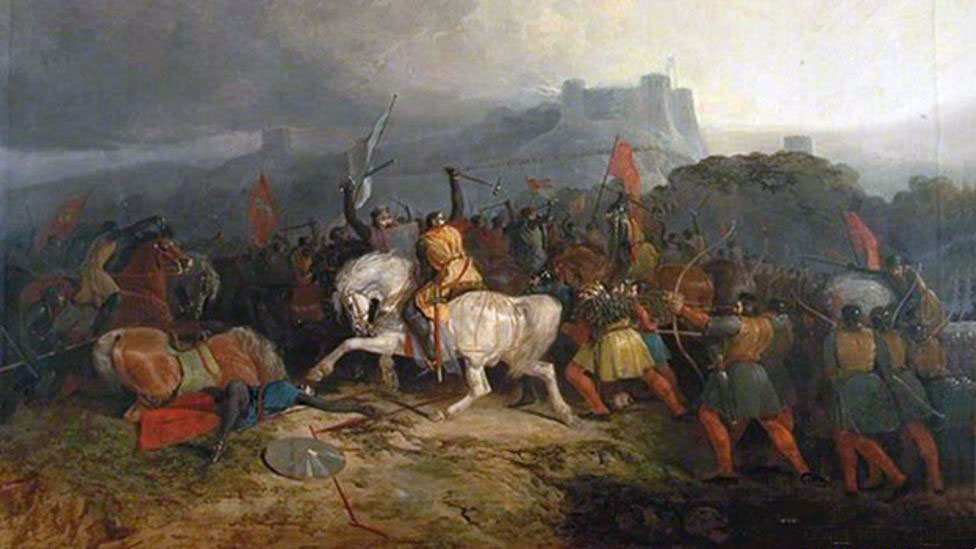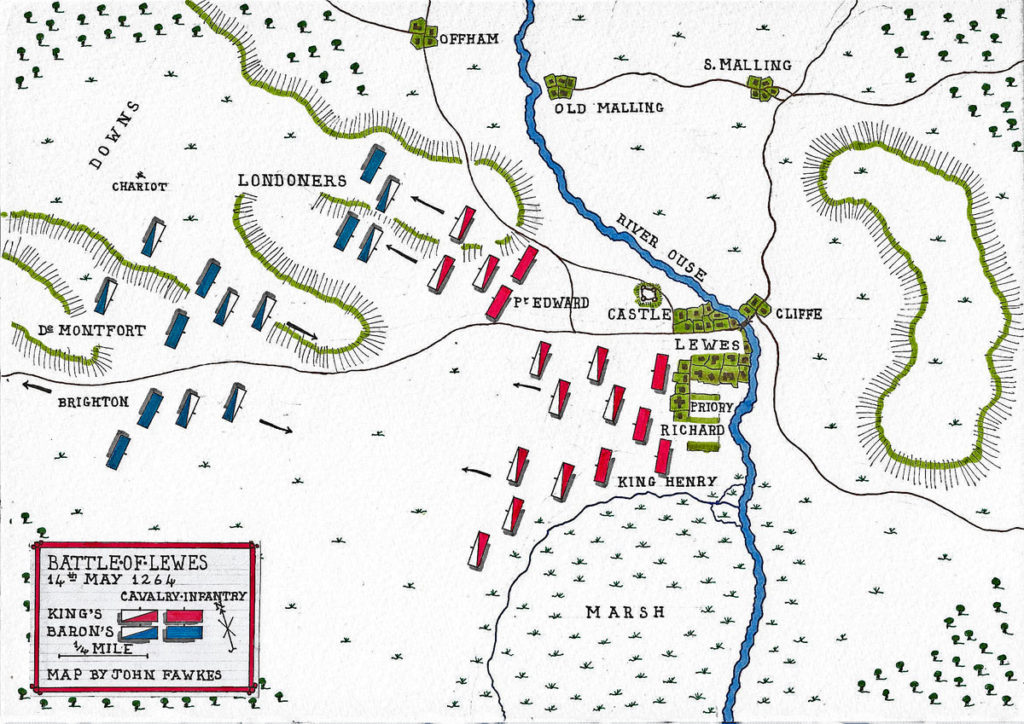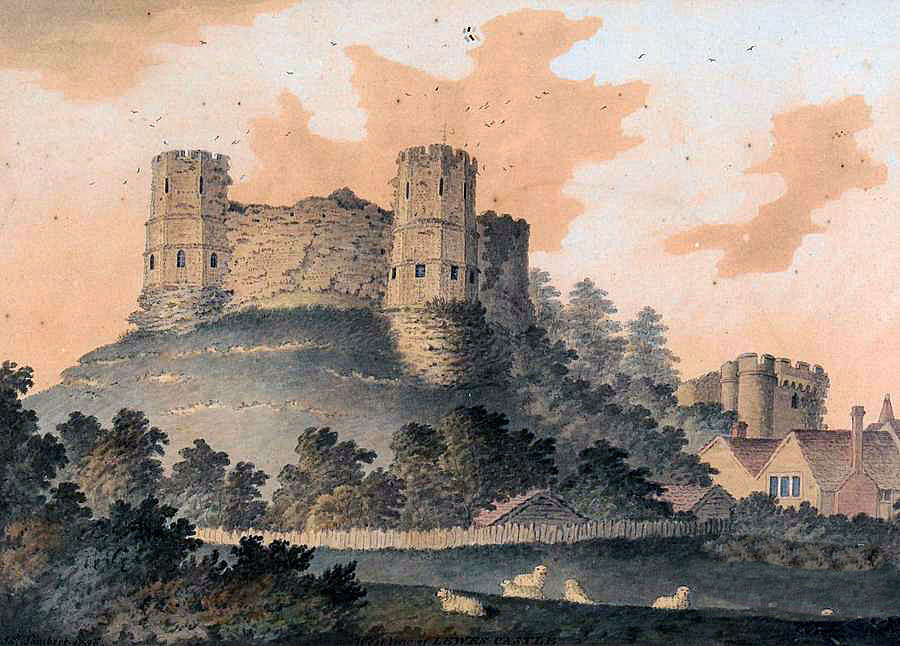The Battle of Lewes on 14th May 1264 between Simon de Montfort and King Henry III in the Second Barons’ War
The previous battle in the Barons’ Wars is the Battle of the Standard
The next battle in the Second Barons’ War is the Battle of Evesham
War: Second Barons’ War.
Date of the Battle of Lewes: 14th May 1264
Place of the Battle of Lewes: outside the town of Lewes in Sussex in the south of England
Combatants at the Battle of Lewes: The barons of England in revolt against King Henry III.
Commanders at the Battle of Lewes: Simon de Montfort, Earl of Leicester, led the rebellious barons against King Henry III and his son Prince Edward, later King Edward I.
Size of the armies at the Battle of Lewes: The contemporary chroniclers greatly exaggerate the size of each army making it impossible to give reliable information other than that the royal army was larger than the rebel army of de Montfort.
Uniforms, arms and equipment at the Battle of Lewes: Each army comprised a mounted contingent of knights and men-at-arms and infantry who were either archers armed with the long bow or ordinary soldiers carrying spears, clubs, swords or any other weapon available to them.
At this time armour worn by those able to afford it comprised chain mail suits with steel helmets and shoulder and knee pieces.
A few of the infantrymen were armed with crossbows.

Winner of the Battle of Lewes: De Montfort defeated the royalist army, capturing King Henry III and Prince Edward.
Events leading to the Battle of Lewes:
In April 1263 Simon de Montfort returned to England from France to find the English barons in revolt against King Henry III, with England divided between the two sides.
The revolt was a further instalment in the simmering war between the baronage of England and the English monarchy.
Simon de Montfort, Earl of Leicester, assumed the leadership of the barons, while King Henry III was supported by his brother Richard, Earl of Cornwall, also known as the King of Rome and Henry’s son Prince Edward, later Edward I.
Among the key noblemen supporting de Montfort were De Warrene, the Earl of Gloucester, the Despencers, William Marmion, Robert de Roos, Richard Grey, John Fitz-John and Nicholas Seagrave.
A number of Scots noblemen brought forces to fight for King Henry III; among them Robert Bruce (father of the later king of Scotland and winner of the Battle of Bannockburn), John Comyn of Badenoch and John Baliol, another future King of Scotland.
After a period of manoeuvre around the Midlands and South of England the armies of the two sides met at Lewes in Sussex.
Account of the Battle of Lewes:
De Montfort followed the King from London with his army reinforced by a contingent of Londoners, resolved to attack the King’s army although his own army was smaller.
The town of Lewes lies on the bank of the River Ouse.
At this time the Ouse was tidal up to Lewes and the area to the south of the town flooded with each high tide, creating an extensive area of marsh on the southern boundary of the town.
On the east bank of the Ouse stands the steep hill of Mount Caburn.
Lewes, on the west bank, stands at the bottom of a slope rising up to the Downs.
On the north side of the town stood Lewes Castle and on the south side the Great Cluniac Priory of St Pancras in an extensive walled enclosure on the edge of the marsh.
De Montfort’s army approached Lewes from the Downs to the west of the town on 14th May 1264.
The only precaution taken by the King’s army against a surprise attack was to post a piquet on the Downs the day before.
This piquet being tired and hungry returned to Lewes on the night of 13th/14th May 1264, leaving a single sentry who was found asleep by De Montfort’s advancing army.
De Montfort prepared his army for the attack on the Downs overlooking Lewes, the Royalists oblivious of his presence.
Previous defeats at Northampton and Nottingham had caused several of De Montfort’s collaborators to be captured by the King’s troops, leaving De Montfort with a much-reduced army, smaller than the King’s.
De Montfort divided his troops into four battles, three in the front line and the fourth, acting as a reserve, which he himself commanded.
De Montfort’s right division was commanded by Humphrey de Bohun, with John de Burgh and De Montfort’s two sons Henry and Guy.
The Central division was commanded by the Earl of Gloucester.
The left division comprised the London infantry and a body of knights commanded by Nicholas de Segrave.
Once arrayed, De Montfort’s army advanced down the slope towards Lewes, pausing when the Priory came into sight for a prayer.
On the Downs beneath them were the Royalist grooms exercising their horses, who fled into Lewes to warn their masters of the rebels’ approach.
Taken by surprise, King Henry’s army hurried onto the Downs from Lewes, forming in some confusion into its three divisions.
The fourth division had been left to garrison Tunbridge Castle in Kent, leaving the Royal army with no reserve for its battle formation.
Henry’s right division was commanded by his eldest son Prince Edward, accompanied by a number of experienced soldiers.
The central division was commanded by Henry’s brother, Richard, Earl of Cornwall, also known as the King of Rome.
King Henry III commanded the left division with the Earl of Hereford.
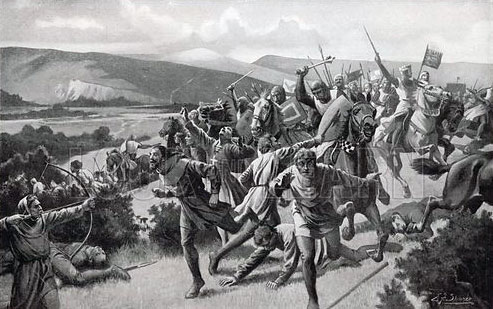
De Montfort’s baronial army charged down the slope at the Royalist army, the left, being in advance of the rest of the army, striking the royalists first.
The royalist army spurred up the slope to meet them, the prince’s division in the lead.
The two forces met with a loud crash.
The outnumbered mounted men-at-arms of Segrave’s division on de Montfort’s left were overwhelmed by the prince’s attack, with several of their leaders taken prisoner.
The remainder were driven into the ranks of the London infantry, throwing them into confusion.
Prince Edward was particularly enraged against the Londoners after his mother the Queen had been insulted the previous year while in the city.
The prince led the Royalist knights and men-at-arms in driving the Baronial left wing off the field.
Misguidedly, the Prince continued his pursuit of de Montfort’s left wing for some three miles, inflicting terrible retribution on the fleeing Londoners, but leaving the rest of the royal army without the assistance of his wing.
On their eventual return to the battlefield, Prince Edward’s men delayed to capture de Montfort’s baggage and chariot, mistakenly believing the chariot to be carrying de Montfort himself.
Meanwhile, in the rest of the battle de Montfort’s centre and right wing, after several hours of severe fighting completely overwhelmed the royalist centre and left wing, inflicting casualties and capturing important knights and noblemen including Percy and the Scotsmen, Baliol, Comyn and Bruce.
Richard, Earl of Cornwall, the king’s brother, took refuge in a windmill, while the battle rolled past him.
King Henry’s horse was killed under him. The King’s courtiers took him to the Priory, where some of the royal army took refuge.
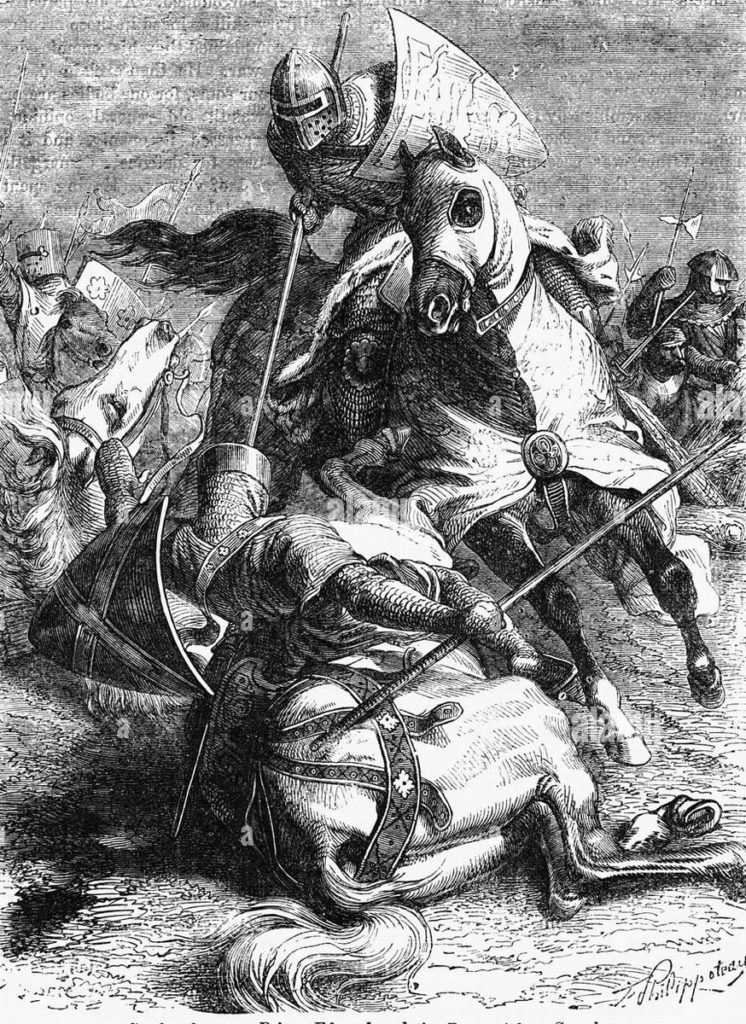
The majority of the fleeing royalists were forced further south where some attempted to escape by riding into the marsh, in many instances they and their horses being drowned.
Some managed to escape through the town of Lewes.
The majority of the surviving Royalist army were forced to surrender to de Montfort’s men, including Richard on finally emerging from the windmill.
When Prince Edward’s returning right wing appeared on the Downs above Lewes, de Montfort’s army turned to attack it.
The prince was preparing to give battle, but the majority of his force rode off the field, leaving the prince to fight on with a small group of dedicated supporters.
At nightfall the King and the Prince gave up the unequal fight and sought terms from the barons.
They entered into the ‘Mise of Lewes’ whereby the king’s army laid down its arms, the prince became de Montford’s hostage and negotiations began for the terms under which the king might continue to reign.
Casualties at the Battle of Lewes: casualties at the battle are considered to have been light, probably around 3,000 in all with many more royalist troops taken prisoner.
Of the royalists, William de Walton was slain and Fulk Fitzwarren drowned in the marsh.
William le Blound, commander of de Montfort’s baggage guard, was killed while defending the chariot.
Follow-up to the Battle of Lewes:
Following the battle de Montfort became the de facto ruler of the country with King Henry III and Prince Edward as his prisoners.
This situation continued until May 1265, when Prince Edward escaped from de Montfort’s control and raised the king’s banner, summoning those loyal to King Henry to resist de Montfort and the other rebellious barons and restore the king to his throne.
The subsequent campaign led to the Battle of Evesham on 4th August 1265
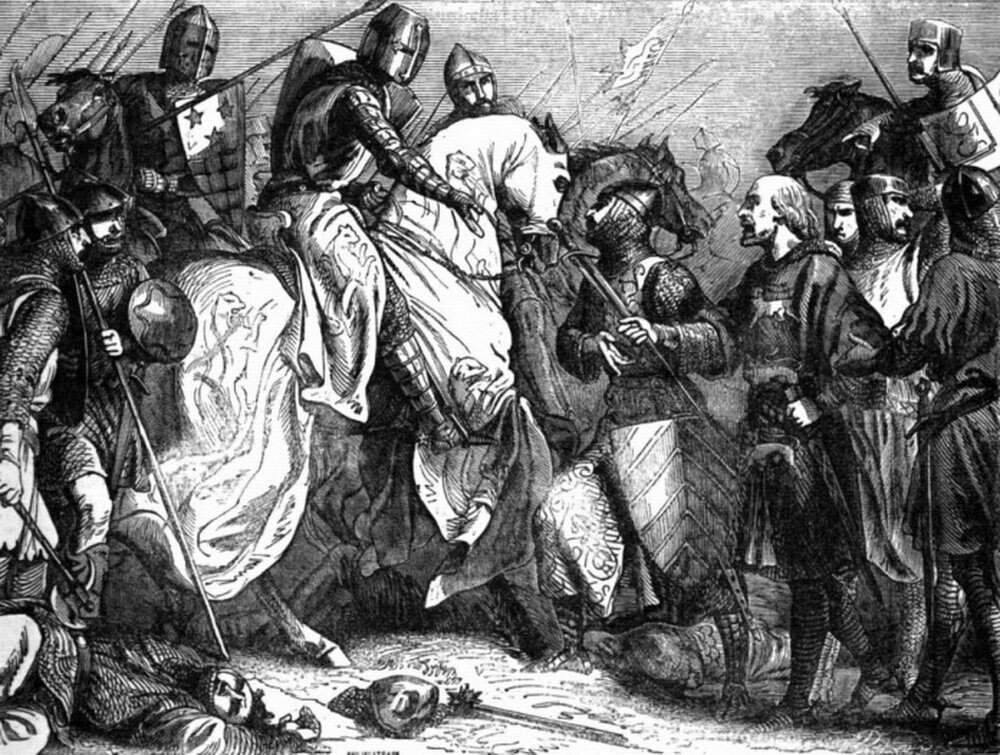
Anecdotes and traditions from the Battle of Lewes:
- The son of the Earl of Hereford held a command in the left guard of the rebel army, while his father held a similar position in the royal army.
- De Montfort attempted to give the rebellion a religious motivation, denouncing the alleged perjuries of the king. The rebels wore white crosses on their surcoats as if they were on a crusade and before the battle the Bishop of Chichester gave the army a general absolution and promised heaven to all who might fall.
- The site of the battle on the Downs several centuries later became Lewes Race Course.
References for the Battle of Lewes:
The Art of War in the Middle Ages Volume One by Sir Charles Oman
Battles in Britain 1066 – 1517 by William Seymour
British Battles by Grant.
The previous battle in the Barons’ Wars is the Battle of the Standard
The next battle in the Second Barons’ War is the Battle of Evesham
